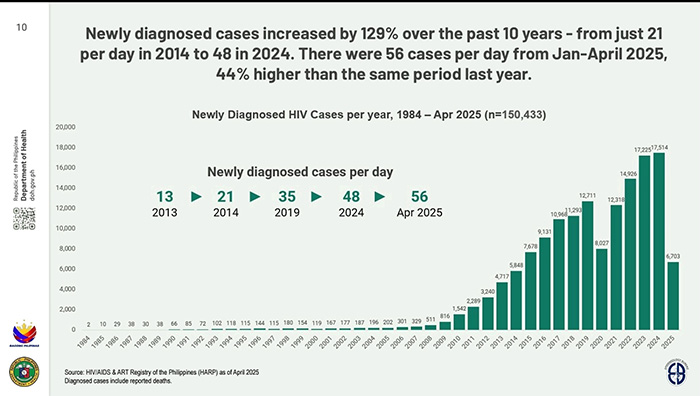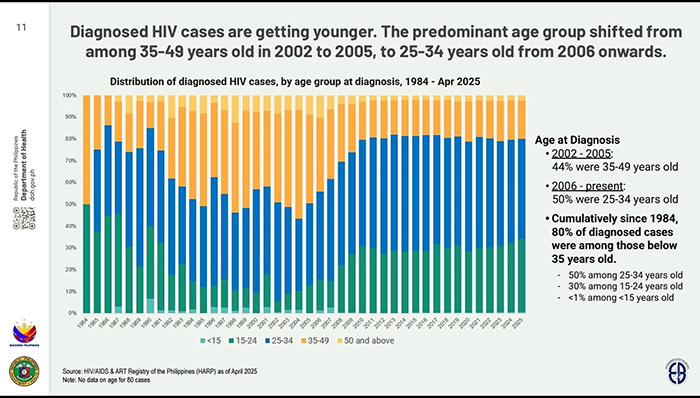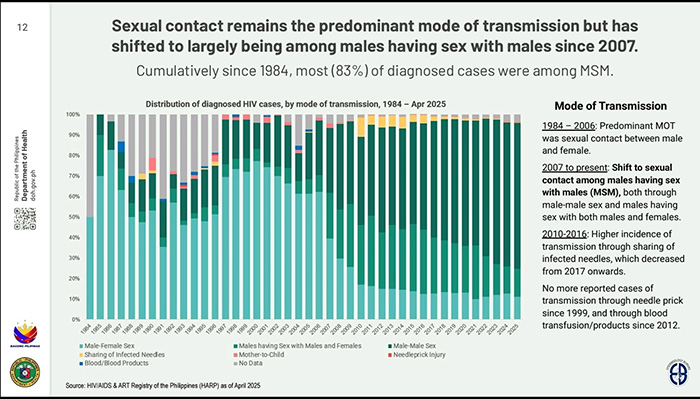DOH: HIV cases surge 500% among youth in PH
The Department of Health has proposed declaring the human immunodeficiency virus a national public health emergency as cases in the country rose by 500% among individuals aged 15 to 25.
According to the agency, the country is now seeing an average of 56 new HIV cases per day from January to April 2025.
"Maganda na magkaroon tayo ng national public health emergency for HIV dahil magtutulong-tulong ang buong lipunan. [The] rule of society [and the] rule of government can help us in this campaign na mapababa ang new cases of HIV," Health Secretary Ted Herbosa said in a video.
"Ang malaking problema po natin ay hindi monkeypox kundi ang paglaganap ng HIV," he added.
The DOH also stated that the Philippines now holds the highest number of new HIV infections in the entire Western Pacific Region. The youngest recorded HIV-positive individual is a 12-year-old from Palawan.
"Kapag hindi po natin napigilan ang pagdami ng HIV aabot tayo sa lagpas 400,000 people living with HIV," the chief added.
HIV in the Philippines by the numbers
Over the past decade, the rate of new HIV diagnoses has more than doubled, from 21 new cases per day in 2014 to 48 per day in 2024. From January to April 2025, 56 new cases per day were logged, which is 44% higher than the same period last year.

Moreover, the demographic most affected by HIV has shifted over the years, showing younger Filipinos to be more at risk.
From 2002 to 2005, most diagnosed cases were among those aged 35 to 49. However, since 2006, the majority of new infections have been among 25- to 34-year-olds.

From 1984 to 2006, the most predominant mode of transmission was sexual contact between males and females. This shifted to sexual contact among males having sex with males in 2007.

'More people are getting tested than ever before'
Loveyourself, a non-government organization focused on HIV prevention, care, and support in the country, reassured the public that the increase in cases could also be attributed to how more people are getting tested than ever before.
"HIV cases are rising in the Philippines. But that's not the whole story. Today, more people are getting tested than ever before," the organization wrote. It also emphasized that more people are starting treatment, protecting themselves from HIV with medication like PrEP.
"These things weren't even available 10 years ago. That's why we're seeing the numbers," it added. "Not just because the problem got worse, but because more people are finally coming forward, and we finally have the systems to support them."
Loveyourself further stressed that this "isn't a moment to panic," but to respond "with love, courage, and community."
Protecting yourself from HIV
To protect yourself from HIV, you can go to clinics like Loveyourself's Embrace Virtual Hub. Here, you can consult a doctor, have access to PrEP and other HIV meds, laboratory tests, or even delivery service of your medicines to your home.
Similarly, DOH urged the public to get regular HIV testing as it is free and confidential.
It also recommends following the "Combination Prevention Method," like using condoms, lubricants, PrEP, and anti-retroviral therapy.
According to the Centers for Disease Control and Prevention, HIV attacks the body's immune system. It's spread through anal or vaginal sex, sharing needles, syringes, or other equipment used to inject drugs.
HIV can be transmitted through certain body fluids like blood, semen, pre-seminal fluid, rectal fluids, and vaginal fluids. These fluids must come in contact with a mucous membrane or damaged tissue if not directly injected into the bloodstream for transmission to occur.
Without treatment, HIV can lead to AIDS or acquired immunodeficiency syndrome, a late stage of the virus infection when the immune system is already badly damaged.
The CDC said people with AIDS typically survive for about three years without HIV medicine. People who contract the virus will have it for life.
There's no effective cure for HIV to date, but proper medical care can control the virus.
To know your status, here is the list of places where you can get free testing and treatment for HIV in the country.


